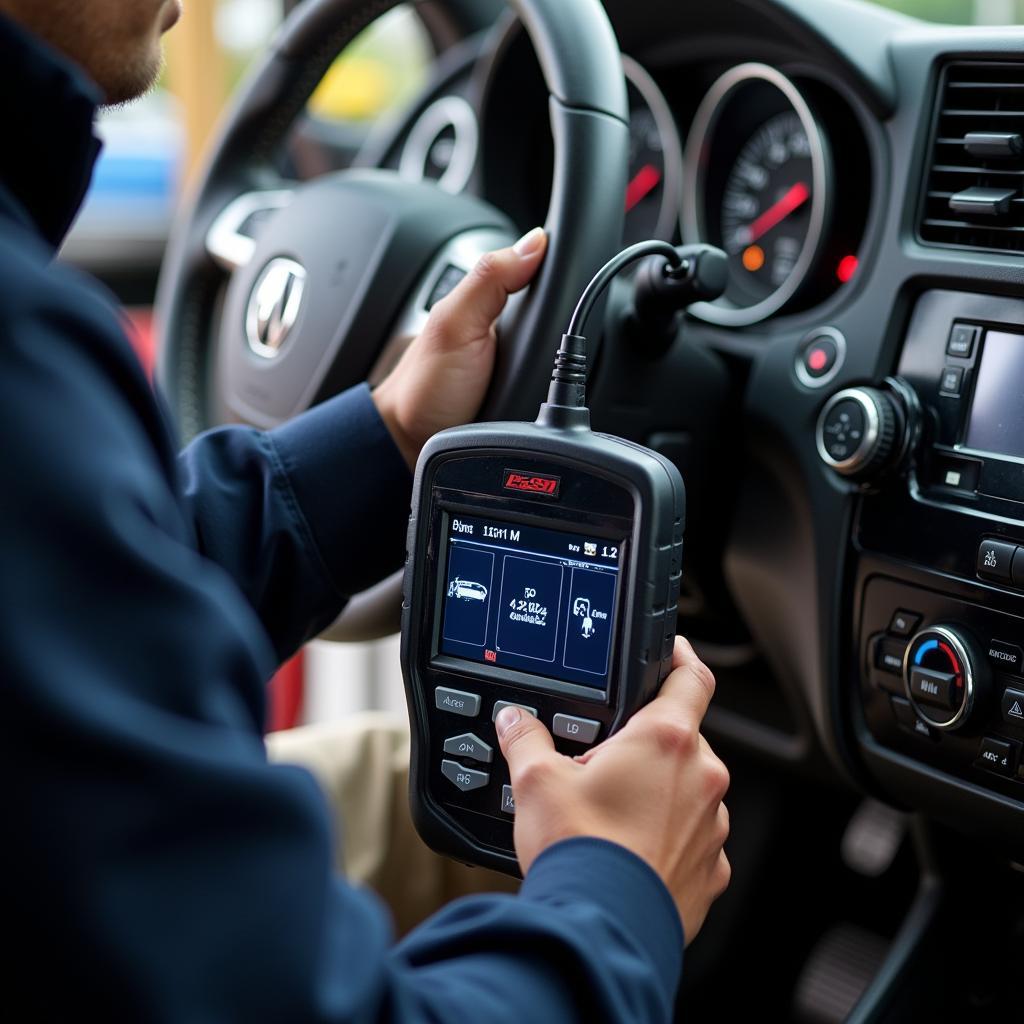Car system diagnostics are essential for maintaining your vehicle’s health, performance, and safety. As cars become increasingly sophisticated, with intricate electronics and computer systems, diagnosing issues goes far beyond just popping the hood and taking a look. This article explores the complexities of car system diagnostics, empowering you to make informed decisions about your vehicle’s maintenance and repair.
What is Car System Diagnostics?
Car system diagnostics involve using advanced tools and techniques to assess the health of your vehicle’s various systems. This process goes beyond just identifying a problem; it delves into the root cause of the issue. By plugging into your car’s computer system, often through the OBD-II port, specialized diagnostic tools can retrieve valuable data, such as:
- Error Codes: These codes, also known as Diagnostic Trouble Codes (DTCs), act as flags, indicating a specific area where the system detects a problem.
- Sensor Data: Modern vehicles rely on numerous sensors to monitor everything from engine temperature and emissions to tire pressure and airbag deployment readiness. Diagnostic tools can read and interpret this data, providing a comprehensive view of your car’s real-time performance.
- Historical Data: Your car’s computer stores a record of past events, which can be invaluable in diagnosing intermittent problems or identifying patterns that point to a developing issue.
The Importance of Car System Diagnostics
Timely and accurate car system diagnostics are crucial for a number of reasons:
- Early Problem Detection: Diagnostics can often identify issues before they escalate into major, costly repairs. This proactive approach can save you time, money, and potential headaches down the road.
- Improved Safety: By detecting issues related to brakes, airbags, steering, or other safety-critical systems, diagnostics play a vital role in ensuring your vehicle is safe to drive.
- Enhanced Performance: When your car’s systems are operating optimally, you experience better fuel efficiency, smoother handling, and overall improved performance.
- Informed Decision Making: Diagnostic reports provide you with the information you need to make informed decisions about repairs. You’ll have a clear understanding of the problem, the recommended solution, and the associated costs.
Common Issues Diagnosed through Car System Diagnostics
multi system car diagnostics encompass a wide range of vehicle systems, including:
- Engine and Transmission: Diagnosing issues related to engine misfires, transmission slipping, or unusual noises.
- Braking System: Identifying problems with ABS, brake fluid levels, or brake pad wear.
- Emissions System: Diagnosing issues with the catalytic converter, oxygen sensors, or evaporative emissions system.
- Electrical System: Troubleshooting problems with the battery, alternator, starter, or wiring.
- Air Conditioning and Heating: Diagnosing issues with the compressor, refrigerant levels, or climate control system.
Types of Car Diagnostic Tools
A variety of diagnostic tools are available, ranging from basic code readers to advanced professional-grade systems:
- Code Readers: These handheld devices can read and clear basic error codes, giving you a general idea of the problem.
- OBD-II Scanners: More advanced than code readers, OBD-II scanners provide more detailed information about error codes, sensor data, and historical data.
- Professional Diagnostic Scanners: Used by mechanics and dealerships, these high-end tools offer comprehensive diagnostic capabilities, including bi-directional control (the ability to command certain vehicle systems to activate), programming, and coding functions.
DIY vs. Professional Diagnostics
While basic code readers can be helpful for DIY enthusiasts, it’s important to note that accurately interpreting diagnostic data and addressing complex vehicle issues often requires the expertise of a qualified mechanic. A professional technician has the knowledge, experience, and specialized tools to:
- Accurately interpret complex error codes: DTCs can be tricky to decode without a deep understanding of vehicle systems.
- Perform in-depth system analysis: A professional can use advanced diagnostic tools to access live data streams, perform active tests, and analyze historical data to pinpoint the root cause of a problem.
- Diagnose intermittent or difficult-to-reproduce issues: Mechanics have the skills and experience to identify issues that may not be immediately apparent.
car engine management system diagnostics repairs telford can save you significant time and money in the long run.
The Future of Car System Diagnostics
The field of car system diagnostics is constantly evolving. As vehicles become more technologically advanced, we can expect to see:
- Increased use of telematics: Telematics systems, which allow vehicles to communicate wirelessly, are becoming more prevalent. These systems can transmit diagnostic data to your mechanic or even the manufacturer, enabling predictive maintenance and remote diagnostics.
- Artificial Intelligence (AI) and Machine Learning: AI and machine learning algorithms are being integrated into diagnostic tools, allowing for faster and more accurate problem identification and prediction.
- Augmented Reality (AR) and Virtual Reality (VR): These technologies are being explored as tools to assist mechanics in diagnosing and repairing vehicles.
Car system diagnostics are an essential aspect of modern vehicle maintenance. Understanding the importance of diagnostics, the information they provide, and the different types of tools available can help you make informed decisions about your car’s care. While DIY options exist, seeking professional assistance from qualified mechanics is often the best way to ensure accurate diagnosis and effective repairs, keeping your vehicle running smoothly and safely for years to come.

